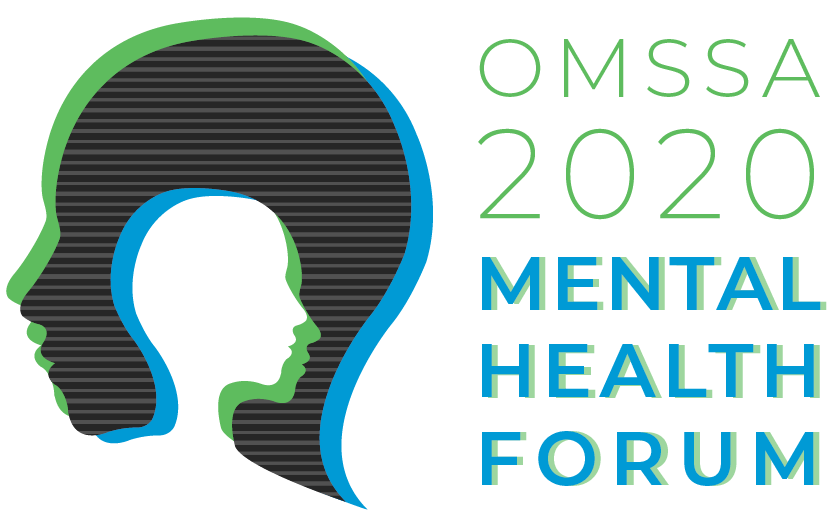Program Details
Virtual Mental Health Forum
October 21-22, 2020

WEDNESDAY, OCTOBER 21

9:00 to 10:00 a.m.
KEYNOTE Definitely Not Normal: Resilience in Destabilizing Times
Dr. Robyne Hanley-Dafoe
Show / Hide Session DescriptionThe events of 2020 have been an incredible test of our resilience. The term new normal has become part of our shared narrative, but Dr. Robyne Hanley-Dafoe argues that this framing is not only unhealthy, but it also undermines the efforts of helping professionals who have been doing everything in their power to keep communities healthy, supported and safe. Even before the pandemic, the prevalence of mental health issues, addictions, stress and burnout put an immense strain on our communities. As COVID has created increased pressures and brought many aspects of daily life to a startling halt, it has also created an opportunity to re-examine how we can better foster resiliency in ourselves and our clients. With a message that is both practical and inspirational, multi-award-winning psychology and education instructor Dr. Robyne Hanley-Dafoe helps participants regain a sense of order in destabilizing times. In this interactive and engaging keynote, Dr. Dafoe will examine the fundamentals of resiliency, sharing strategies grounded in global research and real-world case studies that help foster resiliency within others and ourselves.
10:30 a.m. to 12:00 p.m.
CONCURRENT WORKSHOPS
The Capital "L" Leader: Mental Health Leadership for Organizations
Show / Hide Session DescriptionCOVID-19 has shown us how quickly our working world can be turned upside down, and Capital "L" Leadership can play a key role in helping teams manage mental health strain and develop new skills applicable to their teams, clients, and families. During this workshop, Brian Knowler will lead you through core elements that leaders need to ensure they and their teams can navigate the many impacts that mental health issues can have in today‘s uncertain world.
*This session is also available on Day 2
Stress and Traumatic Stress in the Workplace
Show / Hide Session DescriptionThis session will explore how stress, anxiety, and traumatic stress impact the workplace and human services staff. Using best practices identified by the Canadian Mental Health Association, participants will explore how to notice, talk about, and collaborate on interventions to mitigate or eliminate the psychosocial risks associated with stress and trauma. Paying particular attention to secondary traumatic stress, participants will leave with a greater understanding of the impacts their work can have on their mental health.
Speaker: Lawrence D. Blake, M.Phil, PhD(c), Certified Psychological Health and Safety Advisor Program Manager, Mental Health Works, Canadian Mental Health Association
Into the Unknown: Social Assistance Reform in Uncertain Times
Show / Hide Session DescriptionUnder the Province’s new social assistance reform model, Ontario Works will increase its focus on stabilizing the lives of clients, and will no longer provide employment-related services. However, even service managers in prototype areas that are currently transitioning to this new model lack information about the overall vision for the new system and the details of how it will work. In this session, service managers in prototype areas will discuss how they are navigating this incredibly challenging situation in order to support, equip and prepare staff to support the mental wellness of clients.
Moderator: Grace Mater, OMSSA Secretary and Director, Children's Services & Neighbourhood Development Division, Healthy & Safe Communities Department, City of Hamilton
Speakers:
- Melissa Austin, Manager of Social Assistance and Employment Opportunities, Niagara Region Community Services
- Ann Marie Fitzgerald, Manager of Social Assistance and Employment Opportunities, Niagara Region Community Services
- Bonnie Elder, Director of Ontario Works, City of Hamilton
- Susan Evenden, Director of Social Assistance and Homelessness, City of Brantford
- Jennifer Glover, Ontario Works Manager, Northumberland County
- Janine Mitchell, Manager of Human Services, City of Kawartha Lakes
- Cheryl Faber, Director of Social Assistance, District of Muskoka
Supporting Clients' Mental Health: An Interactive Session
Show / Hide Session DescriptionThe COVID-19 pandemic has been especially difficult for those living in social and economic conditions that already contribute to poor mental health. Without equitable access to support and resources, social assistance clients are at greater risk of self-medicating to cope with isolation, loneliness, fear, and the resurfacing of traumatic memories. In this session, psychotherapist Megan Phillips will provide an overview of relapse warning signs, and brainstorm with the audience about creative ways to connect clients with they help they need in these very difficult times.
1:00 p.m. to 2:30 p.m.
CONCURRENT WORKSHOPS
De-escalation Techniques and Crisis Management for Distressed Clients
Show / Hide Session DescriptionThis workshop will teach front-line human services professionals how to diffuse challenging situations using speech, body language, locus of control, active listening, empathy, rapport-building, service navigation and maintaining boundaries. In addition, facilitators will explore how to overcome barriers to implementing these strategies.
Speakers:
- Abhilash Vanethu, Clinical Lead, 24/7 Crisis Support Peel-Dufferin, Canadian Mental Health Association Peel-Dufferin
- Angelica Fasulo-Matajic, Crisis Support Worker, 24/7 Crisis Support Peel-Dufferin, Canadian Mental Health Association Peel-Dufferin
COVID-19, Mental Health and Children
Show / Hide Session DescriptionThe pandemic is shining a light on the social, economic and systemic inequities that place excessive stress on marginalized people, including many low-income, Indigenous, and African-Canadian families. The speakers in this session will discuss how the pandemic is amplifying the need for mental health supports in the communities they serve and discuss interventions for parents and children. This session will also include information about how staff in child care settings can learn to recognize and effectively deal with the signs of anxiety and stress in children, as well as in themselves.
Speakers:
- Ekua Asabea Blair, CEO, Massey Centre for Women
- Cathy Syrette, Executive Director, Indigenous Friendship Centre, Sault Ste. Marie
- Kelly Smith, MSW, RSW, Child Therapist and Trainer, Crisis & Trauma Resource Institute
Fostering Hope and Optimism in Challenging Times
Show / Hide Session DescriptionIn this session, Wendy Beales, MSW, RSW and Supervisor of Programs and Specialized Services with the Region of Durham will explore strategies for tapping into and holding onto optimism during difficult and challenging times. Drawing from therapeutic models such as Acceptance Commitment Therapy, Mindfulness and Narrative Therapy, Wendy will explore ways to increase psychological flexibility and to add to our resiliency tool-kits for the days and months ahead.
*This session is also available on Day 2
THURSDAY, OCTOBER 22

9:00 to 10:00 a.m.
KEYNOTE Layers Not Fractions: Mental Health & Identity
Kim Katrin
Show / Hide Session DescriptionKim Katrin is a public researcher, human rights educator, and co-founder and Executive Director of The People Project, who credits her strong emotional resilience with her ability to heal as a survivor and sustain long term community-based development. Kim’s work is about creating an understanding of health equity through community engagement, and she balances both anecdotal lived experience and tangible practices for immediately reducing stress and confronting trauma. In this keynote, Kim will explore how intersections of race, sexual orientation, and gender impact mental wellness. Through shining a light on these connections, she will guide an inclusive discussion with a holistic focus on mental wellness and community engagement.
10:30 a.m. to 12:00 p.m.
CONCURRENT WORKSHOPS
The Integrated System Navigator: Improving Client Services through Partnerships & Collaboration
Show / Hide Session DescriptionSpeakers:
- Tanya Hall, Supervisor, Program Integrity, Halton Region
- Linda Lysko, Integrated System Navigator, Halton Region
The Capital "L" Leader: Mental Health Leadership for Organizations
Show / Hide Session DescriptionCOVID-19 has shown us how quickly our working world can be turned upside down, and Capital "L" Leadership can play a key role in helping teams manage mental health strain and develop new skills applicable to their teams, clients, and families. During this workshop, Brian Knowler will lead you through core elements that leaders need to ensure they and their teams can navigate the many impacts that mental health issues can have in today‘s uncertain world.
*This session is also available on Day 1
The Great Amplifier: Opioid Overdose in Times of Disruption
Show / Hide Session DescriptionPeriods of disruption increase the risk factors for substance-related harms, often triggering relapses and increasing overdose rates. In this session, expert facilitators will explore why the COVID-19 pandemic is intensifying the Opioid Crisis, and explore emergency response strategies for social services settings.
Speakers:
- Dr. Samim Hasham, Consultant, Rapid Access Addiction Clinics, CMHA Peel; Faculty, Adler College; Session Instructor, Faculty of Health Sciences, McMaster University
- Robb Johannes, Health Promotions Specialist, Community Mental Health Services, Fred Victor; Adjunct Lecturer, Factor-Inwentash Faculty of Social Work, University of Toronto
Remote Work and Mental Health
Show / Hide Session DescriptionWith remote work becoming the new normal, this session will examine the unique challenges this brings to caring for and about employee mental health. It will provide a high-level overview of how we can build psychologically healthy and safe workplaces when the place-of-work is the home. Participants will walk away with an understanding of the concepts of psychological health and safety in a remote work environment, how to care for employee mental health in an asynchronous business resumption process, and how managers and staff can engage in constructive conversations about their needs when they are not present in the physical workspace.
Speaker: Lawrence D. Blake, M.Phil, PhD(c), Certified Psychological Health and Safety Advisor Program Manager, Mental Health Works, Canadian Mental Health Association
1:00 p.m. to 2:30 p.m.
CONCURRENT WORKSHOPS
Healthy at Home: Seniors' Mental Health and Reducing Social Isolation during COVID-19
Show / Hide Session DescriptionIn response to COVID-19, the City of Brantford, in collaboration with community partners, developed five unique programs to promote healthy living, reduce social isolation, and minimize the mental health impacts of physical distancing. The City focused on initiatives that would provide access to community resources, connect residents to virtual programming and provide opportunities for social interaction. In this session, speakers will discuss how the City activated an outreach team, surveyed seniors, implemented a community response, and evaluated to learn more about seniors needs to enhance programming.
Speakers:
- Laura Almeida, Corporate Initiatives Coordinator, Office of the Chief Administrative Officer, Corporation of the City of Brantford
- Chris Henderson, Corporate Initiatives Coordinator, Office of the Chief Administrative Officer, Corporation of the City of Brantford
Racism and Mental Health
Show / Hide Session DescriptionThis session will explore how systemic and interpersonal racism impact the mental health of BIPOC (Black, Indigenous, People of Colour) individuals and communities. Participants will gain a better understanding of unconscious bias, microaggressions, and racial trauma as well as the intersectionality of race and mental health stigma. Clinical Social Worker and Therapist Marci Gray will provide strategies for contributing to change, as well as discuss how non-racialized groups can become an ally to BIPOC communities.
Speakers:
- Marci Gray, Clinical Social Worker and Therapist
Fostering Hope and Optimism in Challenging Times
Show / Hide Session DescriptionIn this session, Wendy Beales, MSW, RSW and Supervisor of Programs and Specialized Services with the Region of Durham will explore strategies for tapping into and holding onto optimism during difficult and challenging times. Drawing from therapeutic models such as Acceptance Commitment Therapy, Mindfulness and Narrative Therapy, Wendy will explore ways to increase psychological flexibility and to add to our resiliency tool-kits for the days and months ahead.
*This session is also available on Day 1